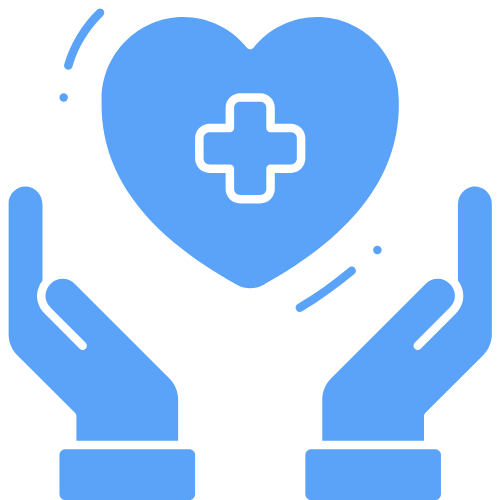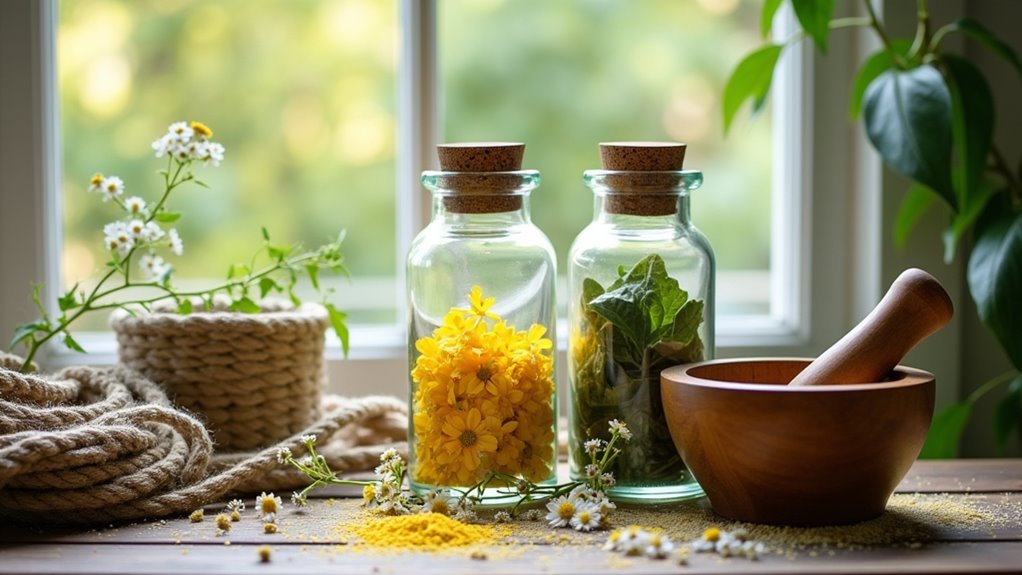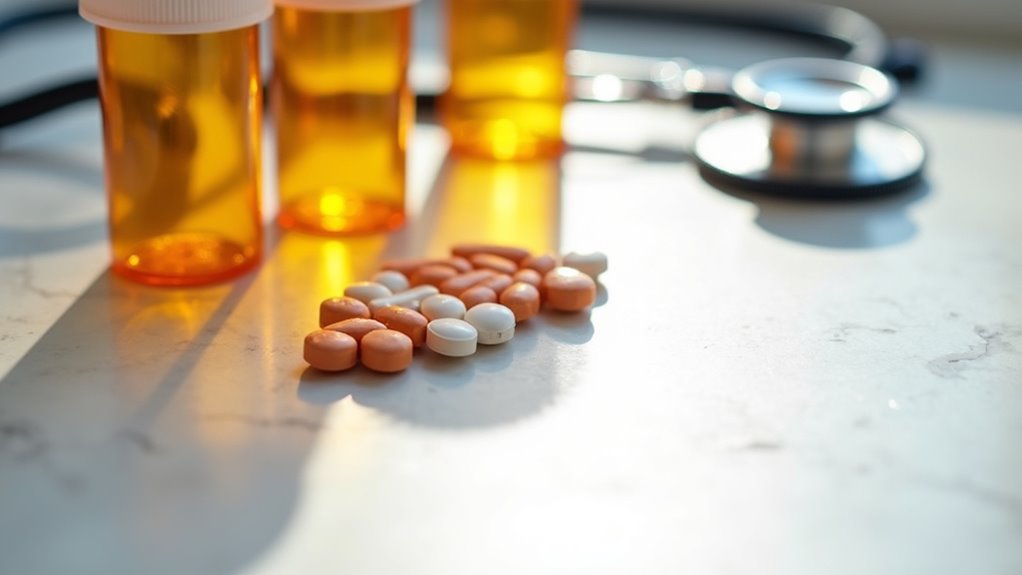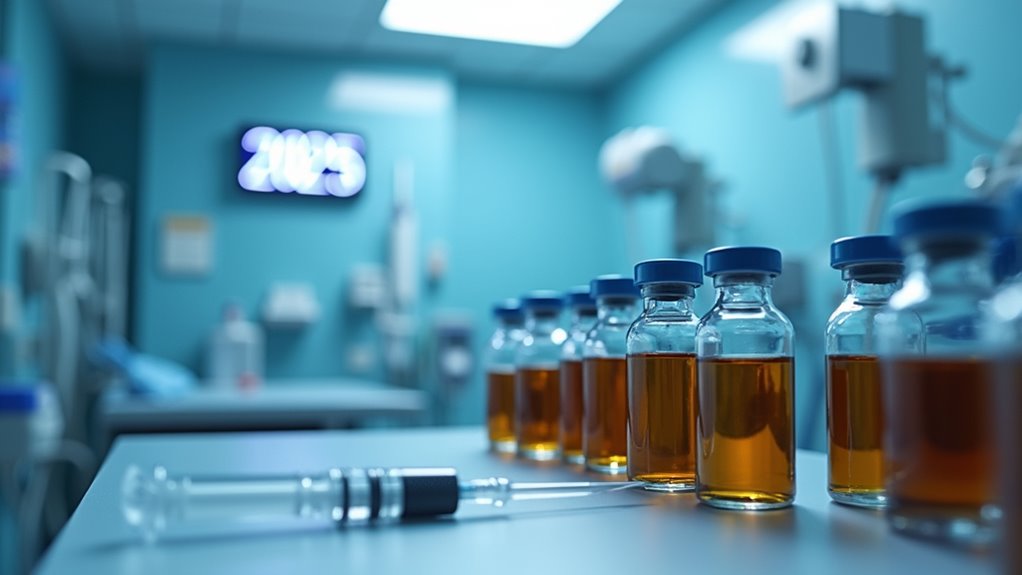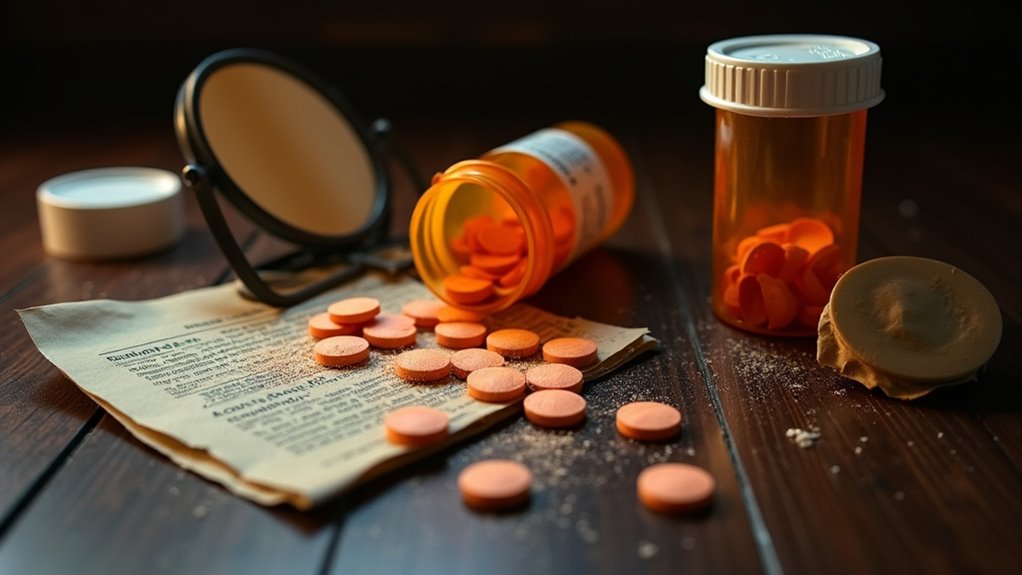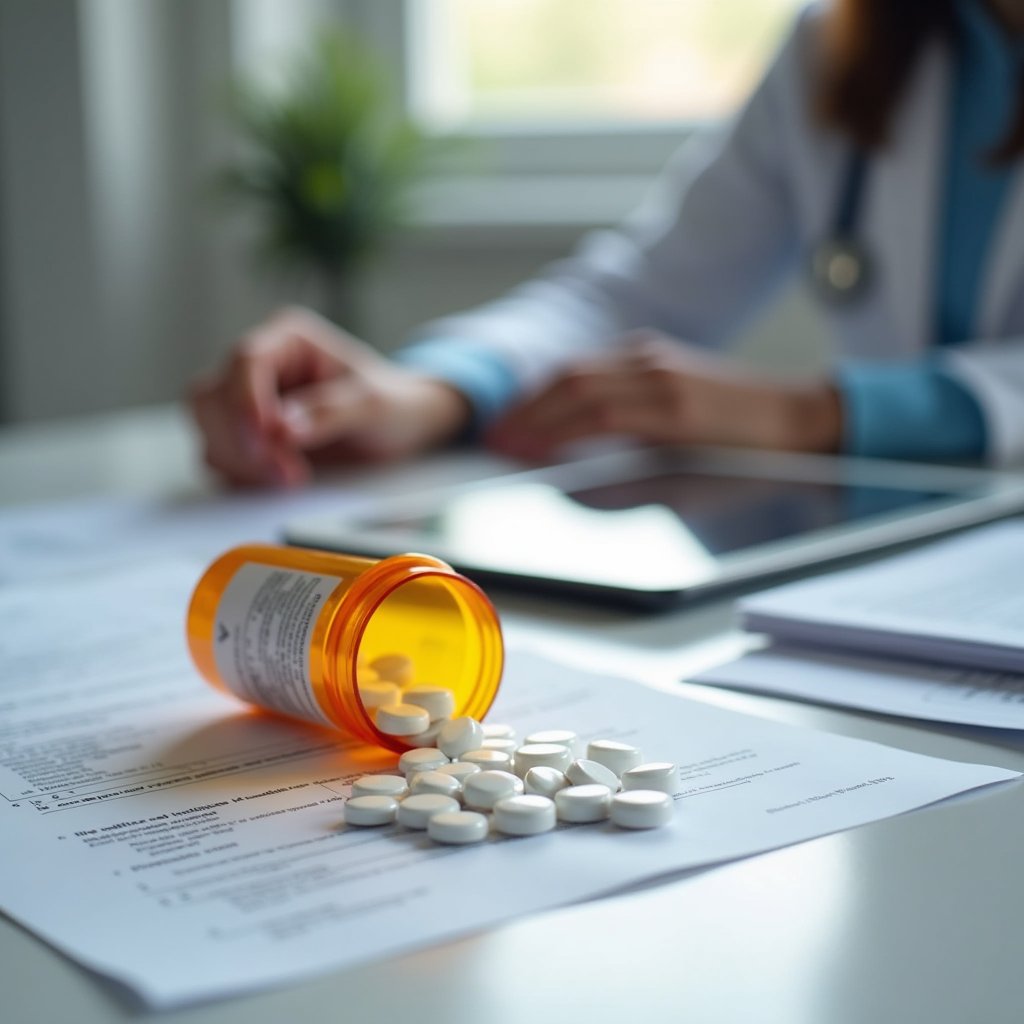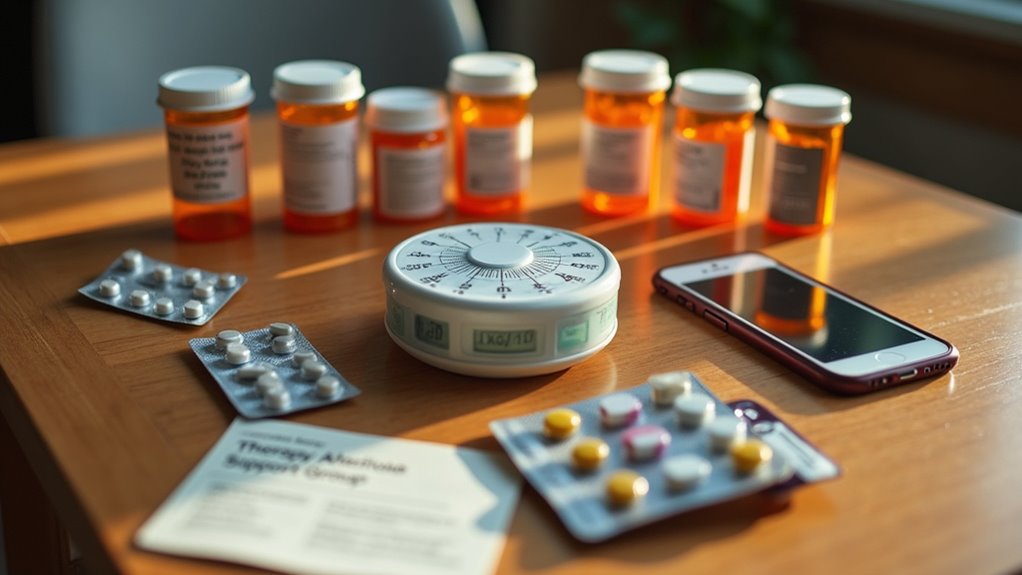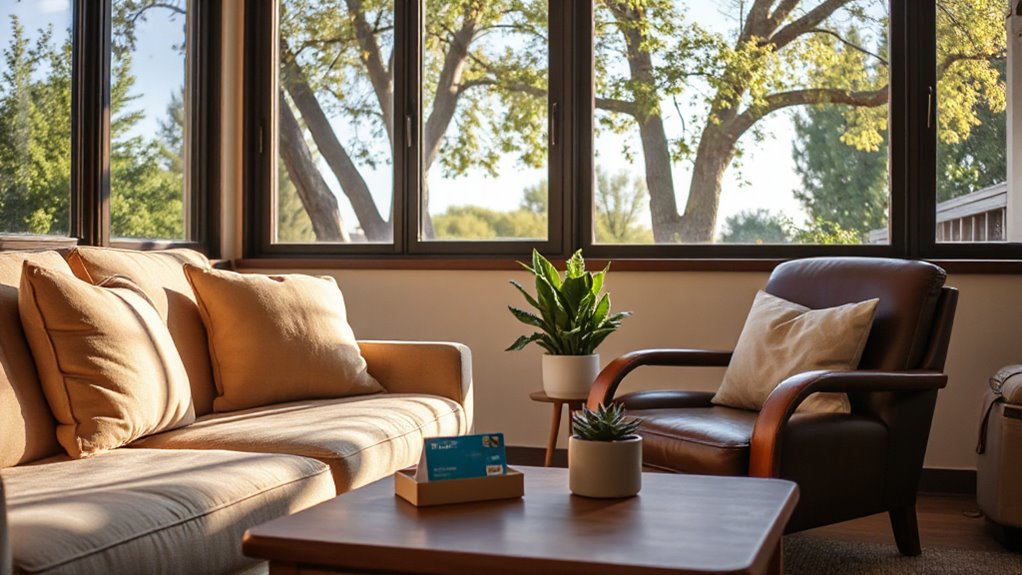While natural alternatives to Suboxone exist, you’ll need to approach them with caution. Supplements like high-dose vitamins C and E, acetyl-L-carnitine, and KB220Z show promise in managing opioid dependence, but they lack FDA approval and extensive clinical validation. Your safest path involves working with healthcare providers who can monitor your progress and potential interactions. Natural options may complement – but shouldn’t replace – proven treatments like Suboxone. The evidence behind each alternative reveals critical considerations for your recovery process.
Understanding Suboxone and Its Role in Recovery
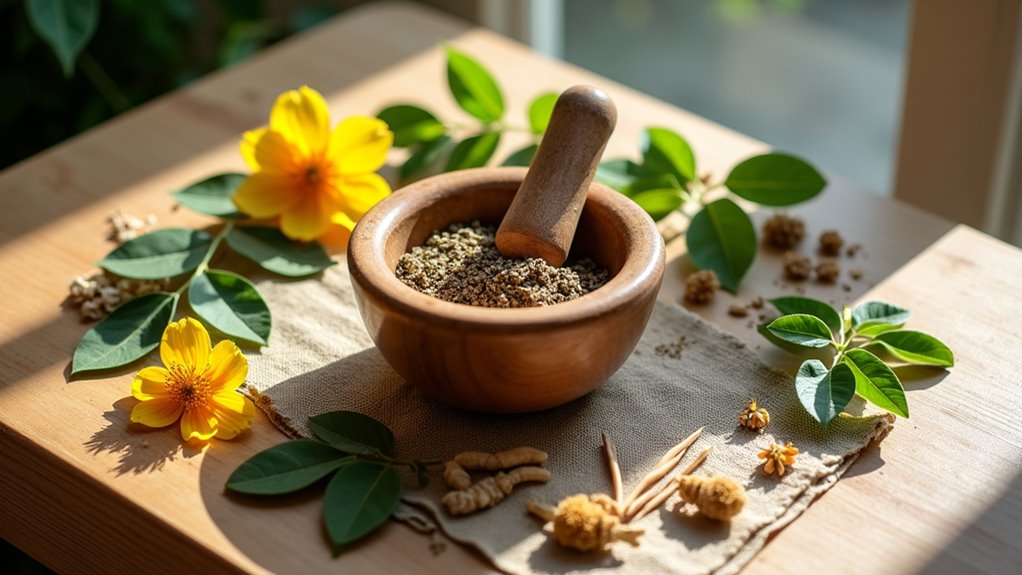
While millions struggle with opioid dependence, Suboxone has emerged as a critical medication-assisted treatment option that combines buprenorphine and naloxone. This carefully formulated prescription drug works by partially activating opioid receptors, helping to control withdrawal symptoms and cravings without producing intense euphoria. As prescription drug abuse trends continue to evolve, Suboxone’s unique composition includes built-in safeguards for buprenorphine misuse prevention. Clinical studies have shown that buprenorphine is 20-50 times stronger than morphine when used at analgesic doses. Suboxone is available as sublingual tablets and buccal films that dissolve under the tongue or inside the cheek. When compared to quitting opioids completely, treatment with Suboxone generally produces better long-term outcomes.
You’ll find that Suboxone’s effectiveness stems from its dual-action approach. The buprenorphine component binds strongly to mu-opioid receptors but only partially activates them, while naloxone deters abuse by triggering withdrawal if the medication is injected. The treatment offers a ceiling effect at higher doses, considerably reducing overdose risks compared to full opioid agonists, while supporting long-term recovery through daily or alternate-day dosing.
Current Natural Supplements Under Investigation
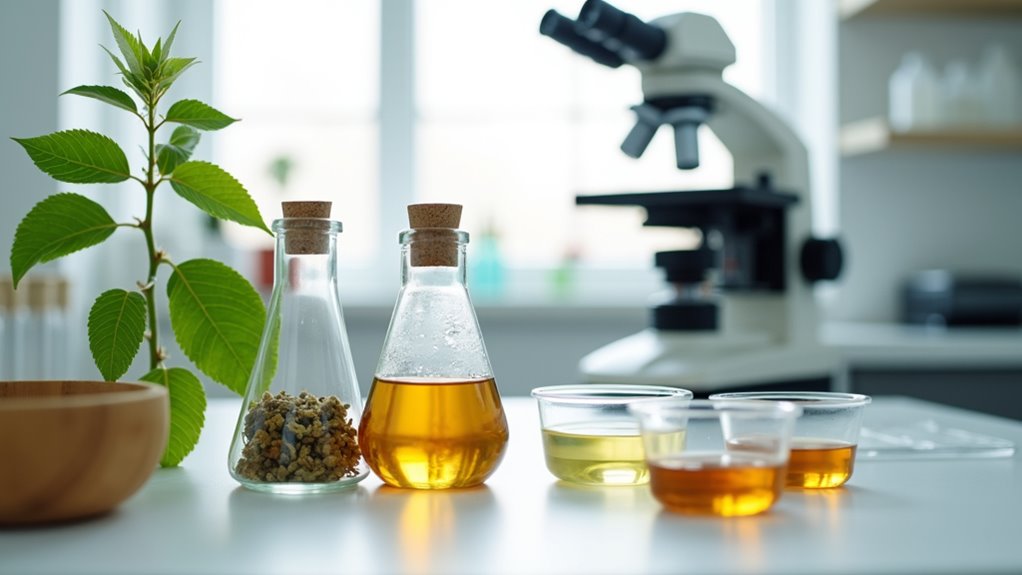
As researchers investigate alternatives to prescription medications like Suboxone, several natural supplements have shown preliminary promise in managing opioid dependence and withdrawal symptoms.
High-dose vitamins C and E have demonstrated modest effectiveness in reducing withdrawal symptoms, with potential dosing protocols of 1,000 mg daily for vitamin C over four weeks. Acetyl-L-carnitine shows potential for addressing nerve-related withdrawal symptoms, though effectiveness data gaps exist due to limited studies. Healthcare providers recommend FDA-approved medications instead of natural alternatives for treating opioid withdrawal symptoms. Evidence shows that these medications can help patients achieve up to 90% reduction in illicit opioid use when properly prescribed.
Preliminary research suggests vitamins C and E, along with acetyl-L-carnitine, may help ease opioid withdrawal symptoms, though more evidence is needed.
While kratom acts on opioid receptors, its safety concerns and regulatory status make it controversial. The supplement commonly causes agitation and tachycardia in users seeking relief from opioid withdrawal. Passionflower extract may help with anxiety through GABA pathways, but clinical evidence remains sparse. Wild ginseng’s adaptogenic properties show promise in animal studies, though human trials are lacking.
Currently, none of these supplements has sufficient evidence to replace conventional treatments like Suboxone.
The Science Behind KB220Z as a Leading Alternative

KB220Z represents a significant breakthrough in natural alternatives to conventional opioid treatments, operating through multiple neurobiological mechanisms. Through amino acid optimization and brain network modulation, KB220Z activates key dopaminergic pathways while augmenting functional connectivity across critical brain regions. The formula’s success stems from its ability to promote dopamine homeostasis, making it particularly effective for those with Reward Deficiency Syndrome. The complex has shown remarkable efficacy in treating patients who previously struggled with prescription opioid misuse, affecting an estimated 21-29% of chronic pain patients. Research demonstrates that KB220Z could help address the devastating opioid epidemic that claims at least 127 lives daily in the United States.
| Brain Region | Function | Clinical Impact |
|---|---|---|
| Nucleus Accumbens | Reward Processing | Reduces Cravings |
| Posterior Cingulate | Emotional Regulation | Improves Mood Control |
| Putamen | Impulse Control | Decreases Impulsivity |
| Cerebellum | Cognitive Function | Heightens Decision-Making |
| Anterior Cingulate | Error Detection | Supports Behavior Change |
Clinical studies demonstrate KB220Z’s effectiveness in reducing withdrawal symptoms and preventing relapse through its neuroadaptogenic properties. You’ll find its impact particularly notable in stress reduction and craving mitigation, supported by significant improvements in behavioral scores and decreased skin conductance measurements during treatment.
Safety Considerations for Natural Treatment Options
Medical supervision remains essential when pursuing natural alternatives to Suboxone, as these treatments lack standardized dosing protocols and formal safety studies. You’ll need careful monitoring for potential drug interactions, particularly if you’re taking other medications or supplements that could affect opioid receptors or liver function. Since Suboxone alone constitutes valid treatment for opioid use disorder, replacing it with unproven alternatives could be dangerous.
Quality control poses another significant concern, as natural supplements aren’t FDA-regulated and may contain undisclosed ingredients or contaminants that could compromise your recovery process.
Medical Supervision Requirements
While natural alternatives to Suboxone may seem appealing, they require careful medical oversight due to significant safety concerns and unregulated status. Unlike FDA-approved medications, natural treatments lack standardized medication monitoring protocols and established patient selection criteria for opioid use disorder.
You’ll need professional supervision to avoid dangerous withdrawal symptoms and potential drug interactions. This is especially critical if you’re pregnant, have mental health conditions, or struggle with chronic pain. Your healthcare provider must establish proper dosing, conduct regular drug screenings, and monitor for adverse reactions.
Natural supplements like KB220Z, while showing preliminary promise as adjunctive therapy, aren’t regulated for addiction treatment. Without medical guidance, you risk severe complications from unverified substances and missed opportunities for evidence-based care that could better support your recovery expedition.
Supplement Quality Control
Before considering natural alternatives to Suboxone, you must understand the significant quality control challenges these supplements face. Unlike prescription medications, natural supplements lack strict regulatory oversight and standardized manufacturing processes. The FDA doesn’t monitor their safety or effectiveness, leading to inconsistent product quality and potential risks. Natural alternatives should always be used as part of a comprehensive treatment plan. Medical supervision is essential when transitioning from Suboxone to any alternative treatment option.
Key concerns you should be aware of:
- Manufacturing processes aren’t standardized, resulting in varying potency between batches and brands
- Limited third-party testing means you can’t be certain about product purity or contamination
- Manufacturers don’t have to prove their label claims through clinical trials
- The risk of undisclosed ingredients or adulterants is significant due to minimal quality controls
These quality control issues make it vital to research manufacturers thoroughly and choose products from reputable companies that voluntarily undergo third-party testing. Since up to 46.6% to 50% of patients experience milder withdrawal symptoms with vitamin C supplementation, ensuring supplement quality is especially critical for those seeking natural alternatives.
Drug Interaction Risks
A critical safety concern when exploring natural alternatives to Suboxone involves their potential interactions with conventional medications and treatments. You’ll need to carefully consider how supplements like passionflower might interact with withdrawal medications like clonidine, as these combinations can require medication dosage adjustments to prevent adverse effects. Since narcotic withdrawal symptoms can be both psychological and physical, coordinating treatment approaches becomes even more complex.
Herbs such as Brahmi and Ginkgo biloba can interfere with antidepressants and blood thinners, while N-acetylcysteine’s impact on liver-metabolized medications remains unclear. Individual liver function impacts vary extremely, especially with unregulated herbal products that may contain undisclosed ingredients. Your liver’s ability to process both prescribed medications and natural alternatives can be compromised, particularly if you have existing hepatic conditions.
Due to these risks and regulatory gaps, it’s crucial to consult your healthcare provider before combining any natural alternatives with conventional treatments.
Integrating Natural Methods With Clinical Support
Integrating natural methods with clinical opioid dependency treatment requires careful coordination between healthcare providers and patients. Your recovery plan should focus on evidence-based approaches while considering herbal therapy integration and dietary supplement oversight under medical supervision.
Work with your healthcare provider to evaluate any natural supplements, particularly KB220Z, which shows early promise but requires more research before widespread clinical adoption. Participate in genetic screening if available, as it may help identify whether you’ll respond better to certain natural compounds alongside traditional treatment. Incorporate stress management techniques and behavioral counseling to complement your medication protocol. Build a support network that includes both clinical professionals and peer groups who understand the nuances of combining natural and conventional treatments.
Always prioritize safety when exploring natural alternatives, especially if you’re pregnant or have mental health conditions.
What Research Reveals About Treatment Success
While clinical studies show promising results for herbal alternatives in managing opioid withdrawal symptoms, you’ll find that over 30% of current research carries substantial bias risks in selection and reporting.
You can look to passionflower’s documented success in combination with clonidine as a remarkable example, where mental withdrawal symptoms improved more significantly compared to conventional treatment alone. The inclusion of Chinese herbal medications has shown particular promise in some trials, potentially offering better symptom relief than traditional treatments. However, you should understand that most studies’ limitations – including small sample sizes and brief trial periods – indicate the need for more extensive research before drawing conclusive findings about long-term treatment success.
Clinical Evidence Shows Promise
Recent clinical studies examining natural alternatives to Suboxone have yielded promising results across multiple therapeutic pathways. Research shows that carefully calibrated alternative combinations, when administered under medical supervision, can help manage withdrawal symptoms through targeted dosage enhancement protocols.
Systematic reviews of herbal therapies reveal that Sophora alopecuroides greatly reduces withdrawal severity, with marked improvements in COWS scores by day 3.
Passionflower extract, combined with clonidine, demonstrates superior efficacy in managing mental symptoms compared to clonidine alone in a 65-participant trial. Unlike these natural options, daily clinic visits are required for methadone treatment, making it a less convenient choice for many patients.
Antioxidant supplementation, particularly vitamin C, shows potential in increasing natural endorphin production during withdrawal.
Traditional herbs like ginseng exhibit therapeutic benefits, though larger clinical trials are needed to establish ideal protocols and standardized treatment approaches.
Long-Term Recovery Rates
As research continues to illuminate the intricacies of opioid use disorder treatment, long-term recovery data reveals encouraging outcomes for patients who maintain consistent therapeutic protocols. Studies show that extended medication adherence (12+ months) can achieve sustained abstinence rates of 75.3%, compared to just 24.1% for shorter durations.
Treatment success correlates strongly with hope and empowerment – a 5-unit increase in hope scores reduces relapse risk by 23%. However, significant demographic treatment disparities persist, with men and older adults dominating treatment cohorts. Medication adherence challenges remain substantial, as less than 20% of OUD patients receive evidence-based medications. When patients do maintain treatment, they experience notable improvements in employment, mental health, and pain management, along with reduced withdrawal symptoms.
Frequently Asked Questions
How Long Does It Take for Natural Alternatives to Show Noticeable Effects?
Natural alternatives’ therapeutic timeframes vary greatly based on your individual physiology and dosage considerations. You’ll typically notice initial effects within 1-2 weeks of consistent use, though full benefits may take 30-90 days to develop.
KB220Z, a studied natural option, has shown effects within 24-48 hours, but you’ll need sustained daily use for ideal results. Remember, these timeframes aren’t well-documented through large clinical trials.
Can Natural Alternatives Be Covered by Insurance Like Suboxone?
You won’t typically get insurance coverage for natural alternatives due to strict insurance coverage requirements and government regulations. Since these alternatives lack FDA approval and aren’t classified as prescription medications, insurers don’t recognize them as legitimate treatments for opioid addiction.
You’ll likely need to pay out-of-pocket for any natural supplements or remedies. In contrast, FDA-approved medications like Suboxone are commonly covered when prescribed by licensed healthcare providers.
Are There Specific Dietary Restrictions When Taking Natural Supplements for Addiction?
When taking natural supplements for addiction recovery, you’ll need to follow specific dietary guidelines to guarantee safe supplement interactions. Avoid grapefruit juice, which can alter absorption rates.
Space supplement dosage considerations around meals – some require taking with food, others on an empty stomach. Consult a healthcare provider about potential interactions with medications and monitor vitamin K intake if using blood thinners. Always maintain proper hydration and balanced nutrition.
What Exercise Routines Best Complement Natural Alternatives During Recovery?
You’ll benefit most from combining gentle yoga practices with mindfulness meditation during recovery. Start with low-impact exercises like walking or swimming to build endurance, then gradually incorporate strength training.
Regular yoga sessions help manage anxiety while improving flexibility and body awareness. Add meditation to your routine to reduce stress and amplify mental clarity. Remember to progress slowly and listen to your body’s signals during exercise.
How Do Seasonal Changes Affect the Effectiveness of Herbal Addiction Treatments?
Seasonal changes profoundly impact your herbal addiction treatment’s effectiveness through multiple environmental factors.
During winter, you’ll need higher doses of mood-stabilizing herbs like St. John’s Wort due to reduced sunlight and increased SAD risk.
Summer’s heat requires lifestyle modifications to maintain proper herb absorption and hydration levels.
You’ll also find that spring/summer offers fresher, more potent herbs, while winter may limit access to certain natural remedies and outdoor therapeutic activities.
